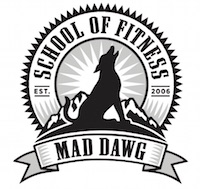Welcome to part 2 of Gwyn’s mental preparation tips for the OktobeRun (sign up here).
We talked yesterday about the first steps of addressing competitive anxiety. We left off at deciding what type of experience you want to have. Once you have found your general motivation(s), it’s time to set specific goals. Why specific goals? Because you need to know what, for you, defines success. There are two types of goals: Product Oriented and Process Oriented. Everyone is familiar with Product Oriented goals: “I want to win an Olympic gold medal!” “I want to be the fastest person on my team,” or “I want to be leaner.” Well, no kidding, so do we all; but how do we get there? We get there through Process Oriented goals. Product goals are very important – they motivate us to work and improve. Process goals keep us on track while we are working.
Some great Product Oriented goals for a novice competitor are:
- I want to learn what it’s all about so I can be ready next time
- I want to keep my composure even if things are a little hard/weird/confusing
- I want to finish
- I want to finish feeling good – not exhausted, not injured, not crazy sore the next day
- I want to have fun with/be supportive of my friend/team
- I want to run the whole time/half the time/part of the time
- I want to finish under X time (make it generous)
- I want to create a baseline for future races (guaranteed Personal Best!)
- I want to do this much exercise, observe how my body responds, and learn how to help it recover
Notice what these goals would do to expectation and fear? Setting goals that are reasonable, attainable, measurable, and healthy for your body will not create anxiety. A lot of these are about maintaining an attitude, observing a situation, and persevering through adversity. That’s what your early athletic competitions are all about! Set goals that are meaningful for you, and have at least one that you are 99% sure you can reach. You can have multiple goals, but prioritize them – and put your “in my wildest dreams” goal at the bottom of the list!
Ok, you’ve defined the quality of experience you will have, by identifying your motivation and setting specific Product Oriented goals. Now it’s time to set your Process Oriented goals.
Some great Process Oriented goals for a novice competitor are:
- Focus on specific techniques or skills my coach has taught me (such as stride length, stride turnover, body position, strong arms, relaxed rhythmic breathing)
- Every few minutes, remind myself, “This is my first time!” or “Wow, this is interesting,” or “What an amazing new experience”
- When things get hard/weird/confusing, Just Keep Going
- Have my timer set to X-minute intervals, and alternate between running and walking for X minutes each
- Stop to stretch/mobilize if necessary. Take my time.
- Smile! Laugh! Be playful!
- Carry a water bottle.
- Have a recovery meal packed & ready.
Process Oriented goals are specific techniques that you focus on while training or competing. They keep you focused on things you can control; and combined with proper preparation, will minimize your anxiety and help you reach your Product Oriented goals and create your ideal competitive experience.
See you tomorrow when we wrap up and give you some specific mental preparation tips.
Gwyn Gordon has coached equestrians for 20 years, including private clients and the Stanford Equestrian Team. In her nearly 40 years of competing, she has had firsthand experience with every possible sports psychology blunder. As a coach, one of her greatest pleasures is helping others learn to thrive and excel under the pressure of competition.
